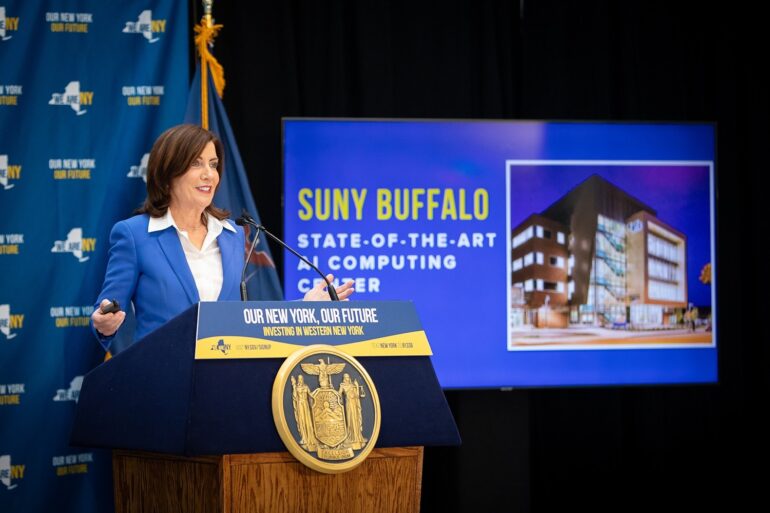TL;DR:
- Governor Kathy Hochul announces Empire AI, a $400 million AI consortium.
- University at Buffalo (UB) is designated as the central hub for Empire AI.
- Plans for a state-of-the-art AI computing center at UB to drive innovation and research.
- The consortium includes SUNY, CUNY, private colleges, universities, and foundations.
- Empire AI aims to accelerate AI research, innovation, and economic growth in New York.
- Governor Hochul’s vision focuses on responsible AI development and its potential impact.
- UB’s expertise in AI research and existing projects highlight its capabilities.
- Collaboration is expected to attract federal funding and promote economic prosperity.
- UB’s role in Empire AI extends to improving student learning and career opportunities.
- UB’s strong faculty expertise positions it as a technological powerhouse in AI.
Main AI News:
In a resounding declaration of New York’s commitment to the burgeoning field of artificial intelligence (AI), Governor Kathy Hochul unveiled her ambitious $400 million project, Empire AI, with the University at Buffalo (UB) at its core. This strategic move is poised to propel New York State to the forefront of the AI revolution.
During her presentation on the 2024-25 budget proposal at UB’s North Campus, Governor Hochul officially designated UB as the statewide epicenter for Empire AI. Notably, she outlined plans for the establishment of a cutting-edge AI computing center at UB. This facility will not only foster innovation but also encourage responsible research, thereby promoting economic development.
Empire AI represents a collaborative effort encompassing SUNY, CUNY, private colleges and universities, and private foundations. Together, these entities aim to expedite AI research and innovation, paving the way for sustained economic growth across the state. Moreover, Empire AI aspires to become a trusted source of information as AI technologies continue to evolve.
Governor Hochul emphasized the significance of this endeavor, stating, “The center will be a global leader and usher in unlimited possibilities for the future of this area that it never could have foreseen.” She also acknowledged the pivotal role that promising UB students, like computer science major Holliday Sims, will play in Empire AI. “We want to make sure that New York State is the capital of AI development and empower young people like Holliday to do this,” she added.
In response to the announcement, UB President Satish K. Tripathi expressed gratitude for the recognition, saying, “We are delighted that the governor is recognizing UB’s longstanding national and international leadership in AI and data science with this momentous designation, which will make UB — as the home of Empire AI — a premier resource center for AI research and innovation.”
Furthermore, Governor Hochul’s vision to position New York State as a responsible AI leader is expected to yield substantial results. It is anticipated that Empire AI will catalyze groundbreaking research, attract significant federal funding, and stimulate the expansion of 21st-century businesses and industries. This, in turn, will contribute to sustained economic prosperity not only in Buffalo and Western New York but across the entire state.
SUNY Chancellor John B. King, Jr. lauded the proposal, stating, “This is an extraordinary moment for SUNY and New York! We are thrilled that SUNY’s University at Buffalo will be the home for Empire AI and a leader in SUNY’s multi-campus participation in this exciting initiative.”
UB Provost A. Scott Weber emphasized the potential impact of Empire AI on student learning, stating, “Through Empire AI, UB and our partner institutions will develop new ways to improve student learning in the classroom, and we will offer students new opportunities to participate in exciting research projects and pursue emerging career paths in industries important to the economic vitality of New York State.”
With its exceptional faculty expertise, UB is poised to harness the vast potential of AI to address critical issues in medicine, education, finance, social justice, and sustainable technologies. Moreover, UB’s prowess in securing cyberinfrastructure program funding from the National Science Foundation (NSF) further reinforces its AI leadership among public and private research universities in the state.
Currently, UB faculty are engaged in various AI-related research projects that have the potential to make a significant impact on society. These projects range from diagnosing and treating speech and language processing challenges in young children to countering online scams and disinformation targeting older adults and children. Additionally, AI is being employed to address diverse challenges, from treating brain aneurysms to predicting disease progression during aging.
Venu Govindaraju, UB vice president for research and economic development, emphasized the wealth of resources and expertise at UB’s disposal. “The University at Buffalo has more than 200 researchers pushing the boundaries of artificial intelligence and data science in cybersecurity, drug discovery and medicine, robotics, education, environmental science, transportation, and other critical fields,” he said. “Empire AI will marshal these resources with those of our partnerships to create a technological powerhouse in New York State.”
Conclusion:
The designation of UB as the core institution for Empire AI demonstrates New York’s commitment to leading the AI revolution. This strategic move, backed by substantial funding and collaboration, positions UB and the state at the forefront of AI research and innovation. It is expected to attract significant federal funding, foster economic growth, and enhance New York’s influence in the AI market, making it a formidable player in the industry.

